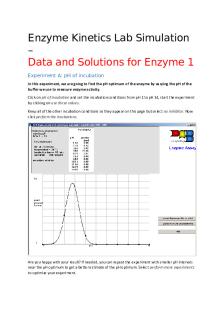Bisc 131 Enyzme Lab - Answers to Bisc 131 Enzyme Lab PDF

| Title | Bisc 131 Enyzme Lab - Answers to Bisc 131 Enzyme Lab |
|---|---|
| Author | Jackson Kennedy |
| Course | Biological Principles Laboratory |
| Institution | Louisiana Tech University |
| Pages | 7 |
| File Size | 174.7 KB |
| File Type | |
| Total Downloads | 30 |
| Total Views | 153 |
Summary
Answers to Bisc 131 Enzyme Lab...
Description
Part 1: Pre-Lab Reading: Use your Pre-Lab reading materials to answer the following questions.
1. T/F: Chemical reactions in living things are sometimes destructive. (1) True
2. What is the purpose of a catalyst? (1) To speed up a chemical reaction
3. Why are catalysts important? (1) For cells to stay alive chemical reactions must occur. On their own, these reactions are slow, however with catalysts they are sped up and therefore the cell stays alive.
4. What is the name for biological catalysts made of protein? (1) Enzymes
5. What is the name for the starting materials of a chemical reaction? (1) Substrates
6. What are two ways that chemical reactions work on substrates? (2) The two ways that chemical reactions work on substrates include breaking them apart into multiple molecules or they will create a chemical bond between two substrate molecules.
7. At what point on the enzyme does a substrate bind? (1) The substrate binds to the active site of an enzyme
8. T/F: The active site of an enzyme is nonspecific to substrates. (1) False
9.
Why does the enzyme undergo a conformational change when binding the substrate? (1) Enzymes undergo a conformational change in order to make a more specific fit for the substrate for the chemical reaction to occur.
10. What is formed from the stress that an enzyme puts on a substrate? (1) The products of the chemical reaction are formed from the stress.
11. T/F: Enzymes can only bind substrates one time before the enzyme is no longer functional. (1) False
12. What is the substrate of the enzyme catalase? (1) Hydrogen Peroxide is the substrate of the enzyme catalase.
13. What are the products of the reaction of catalase with its substrate? (2) Water (H2O) and Oxygen gas (O2) are the products of the reaction. 14. Why is catalase important in the biological function of living things? (1) Certain catalysts such as Hydrogen Peroxide typically break down very slowly and when this happens it creates oxygen free radicals than can be harmful to cellular components. Catalysts are important because they speed up these potentially dangerous chemical reactions into products that are not dangerous.
Part 2: Answer the questions below using the information from this site (the site should automatically scroll down to Enzymes: Slide 4: Factors Affecting Enzyme Activity). http://www.bch.cuhk.edu.hk/vlab2/index.html#2/slide4
15. Name five things that influence reactions rates. (5) Temperature, pH, enzyme concentration, substrate concentration, and ionic strength are all factors that can influence reaction rates.
16. Click “Enzyme Concentration.” Increasing the enzyme concentration increases the ________. (1) a.
Amount of substrate
b.
Product concentration
c.
Both a & b
d. None of the above
17. Click the “...
Similar Free PDFs

BISC 220 Lab Report 1
- 10 Pages

Lab 1 - Lab reports from ast 131
- 3 Pages

BISC 421 syllabus 2021 FInal
- 4 Pages

BISC 120 Exam Review
- 6 Pages

BISC 207 Chapter 21
- 13 Pages

BISC 207 Chapter 27
- 11 Pages

Enyzme activity lab report
- 5 Pages

BISC 206 Chapter 8
- 7 Pages

Enzyme lab
- 4 Pages

204041 131 fredy
- 5 Pages

Criminology 131 Lecture 1
- 4 Pages

BISC 120 Exam Review 3
- 11 Pages
Popular Institutions
- Tinajero National High School - Annex
- Politeknik Caltex Riau
- Yokohama City University
- SGT University
- University of Al-Qadisiyah
- Divine Word College of Vigan
- Techniek College Rotterdam
- Universidade de Santiago
- Universiti Teknologi MARA Cawangan Johor Kampus Pasir Gudang
- Poltekkes Kemenkes Yogyakarta
- Baguio City National High School
- Colegio san marcos
- preparatoria uno
- Centro de Bachillerato Tecnológico Industrial y de Servicios No. 107
- Dalian Maritime University
- Quang Trung Secondary School
- Colegio Tecnológico en Informática
- Corporación Regional de Educación Superior
- Grupo CEDVA
- Dar Al Uloom University
- Centro de Estudios Preuniversitarios de la Universidad Nacional de Ingeniería
- 上智大学
- Aakash International School, Nuna Majara
- San Felipe Neri Catholic School
- Kang Chiao International School - New Taipei City
- Misamis Occidental National High School
- Institución Educativa Escuela Normal Juan Ladrilleros
- Kolehiyo ng Pantukan
- Batanes State College
- Instituto Continental
- Sekolah Menengah Kejuruan Kesehatan Kaltara (Tarakan)
- Colegio de La Inmaculada Concepcion - Cebu



